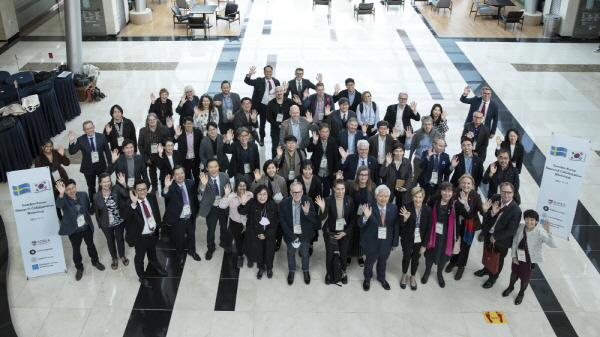Korea University Holds Discussions On Research Cooperation Plans With Swedish Universities
On November 11 (Fri), at 9:30 am, as part of the 3rd Swedish-Korea Nobel Memorial Program (held from November 8 to 12), the Sweden-Korea Research Collaboration Workshop, co-sponsored by the Swedish Embassy, was held at Korea University (Hana Square Hall) with presidents and researchers from major Swedish universities.
The Swedish Embassy in Korea held the Swedish-Korea Nobel Memorial Program from November 8 (Tue) to 12 (Sat) to shed light on the Nobel Prize and celebrate human discovery and curiosity. The Nobel Memorial Program is a forum for discussion expanding the knowledge of award-winning research and achievements in each Nobel Prize field and to raise public interest in science, economics, and literature. Furthermore, this program aims to contribute to the development of research cooperation between Sweden and Korea.
The purpose of the Sweden-Korea Research Collaboration Workshop event is for researchers from Korea University and Swedish universities to exchange broad and professional views on areas of common interest based on mutual understanding between the two countries, and thereby lay the foundation for cooperation promoting academic development and research capabilities between the two countries.
A total of 26 researchers from Korea’s universities, including Korea University, KAIST, and POSTECH, and a total of 31 people from Swedish institutions, namely KTH Royal Institute of Technology, Lund University and Umea University, participated in this academic forum.
Korea University President Chung Jin Taek addressed the audience and said, “We welcome this delegation of researchers and faculty from Sweden’s top three higher education research institutes and see this as an opportunity to learn from each other, share best practices and forge important research collaboration.” He further commented that, “Korea University aspires to become the first domestic university to produce a future Nobel Prize winner” and added that “Korea University prepared the Nobel Plaza on the natural science campus and installed a stone structure in advance to erect a bust of the first KU researcher to receive the Nobel Prize. This demonstrates how much Korea University respects the values pursued by the Nobel Prize and strives to overcome the challenges we face today.”
In this academic forum, researchers from domestic universities and Swedish universities are matched to discuss detailed research cooperation plans in varied academic fields that have recently become important issues, ranging from the fields of electricity, mechanics, physics, and chemistry to digital production, health & bio science, and AI.
For example, in the chemistry session, Professor Lidin of Lund University, who has served for a long time as a member of the Nobel Prize Jury, and 4 Swedish professors, Professor Pullerits of Lund University and Professors Fransson, Norman, and Brumboiu from KTH University met with the Korea University professors Professor Cho Min-Haeng (Director of the IBS Center for Molecular Spectroscopy and Dynamics), Professor Kwak Kyung-won (Department of Chemistry), Professor Tai-Hyun Yoon (Department of Physics), Professor Park Jin-sung (IBS), and Professor Choi Won-Shik (Department of Physics). They were greatly impressed upon hearing about research on catalyst and lithium battery phenomena using ultrafast time-resolved spectroscopy, microscopes using interference phenomena, and super-depth microscope development research. Since each research field is currently attracting great attention worldwide, the Swedish scholars were strongly impressed and exchanged opinions to explore the possibility of joint research through continuous exchange in the future.
In addition, in the Health & Bio Science session, Professor Steven Schmidt of Lund University, who studies Sweden’s countermeasures against aging through a multidisciplinary approach met with the Korea University professors Professor Chung Hae-joo (Director, BK21 Four R&E Center for Learning Health Systems), Professor Chang Sung-ok (Department of Nursing), Professor Song Jun-ah (Department of Nursing), Professor Park Sung-Chul (Division of Health Policy and Management), and KAIST Professor Lee Seung-jae (Department of Biological Sciences). They discussed plans to carry out continuous research exchanges for basic scientific research on aging research, gerontology and public health policy research, and international joint research planning in the field of health learning systems.

